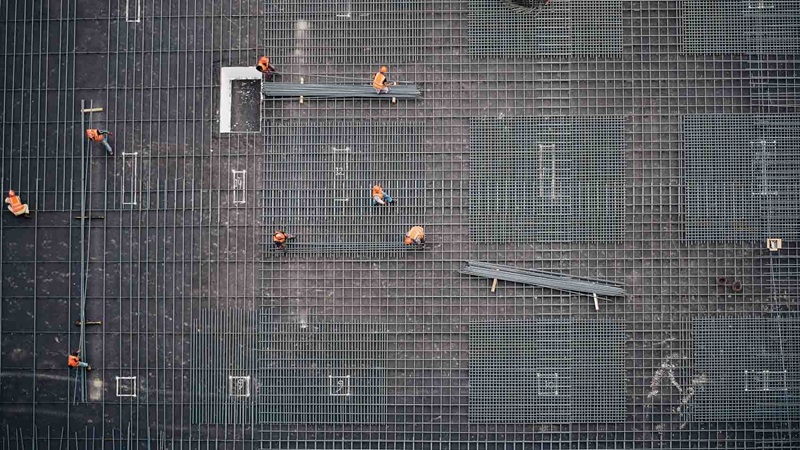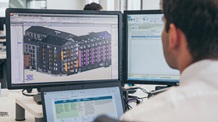Accelerating change – how can the industry do more to innovate?
Innovation drives our industry forward. So why then aren’t we doing all we can to facilitate it? While innovation can often be a slow process, once it gets going, it’s an undertaking that bears many tangible rewards.
According to a report by McKinsey and Co, the construction industry lags behind others in adopting innovation. In fact, less than 1% of construction companies’ revenue goes back into technology research and development. Compare this to the 3.5% invested in innovation by the automotive industry and 4.5% by aerospace companies and it’s clear that there’s work to be done.
While innovation is the responsibility of the many, rather than the few, there’s no doubt that real progress begins at the top, filtering down from industry leaders who have a clear vision and empower their peers to voice ideas for change. That empowerment comes with eliminating a fear of failure – the widespread adoption of a ‘move, fail fast, learn, and iterate’ culture, unbound by worries about getting things wrong.
But even with that leadership and direction in place, from a practical perspective, the question remains: how can the industry do more? It’s all about investment – but perhaps not in the way you might think.
A platform for success
Across the industry, so many projects run a discrete set of processes, tailor-made and customised based on how that project has been defined and operated. But if every project is different, how can we learn from it? And is this bespoke way of working sustainable? The evidence seems to suggest not, but the concept of moving the built environment from a project-led model to an enterprise-level one is both an important but difficult transition for the industry to get right.
In 2020, we partnered with i3p on a client-led and supplier-supported collaboration programme that looked at where the industry needs to innovate and which areas were most in need of improvement. One of the biggest findings was the need for supplier sites to industrialise - but the lessons learned in that process can also aid the wider transition. Within industrialisation, there's a four-step process to follow, with most of the industry not even on step one. On a basic level, that first step is performing the same processes repeatedly, followed by step two: iteration, step three: documentation, before step four: optimisation. So to truly control the conditions of our operations, we must first be able to standardise. Only once there can you automate, which then opens the door for artificial intelligence, machine learning and similar technologies.
Creating this platform for success cannot be accomplished overnight. But we must invest both more time and increased funds in standardising processes on a national, then global level. Only then will be see the true fruits of our labour.
Investing in people
With the pace of change continuing to accelerate, to act with the speed and scale required, requires a shift in mindset and an almost continuous acquisition of new skills and capabilities for the entire industry.
With the diffusion of new technologies to help meet the demands of the modern age and support our transition to a net zero economy, our ability to learn and harness new skills is fundamental to success. For the people and companies who understand and embrace this shift, it creates great opportunity – but to leverage it, we must ensure that we can attract, retain and develop the right people with the right skills. That means dedicating more resource to finding the skills we need right now – the data experts. The innovative thinkers. The graduate minds who offer a fresh perspective. Beyond recruitment, empowering existing colleagues is just as critical. Offering formalised avenues through which ideas can be shared, effective resourcing and alleviating fears of failure. Developing a culture that encourages a journey of progression and learning - however bumpy the ride.
Redefining ambition
Monetary investment in innovation has continued to rise over the last five years and it’s this funding that has been key in driving the technology that our industry is able to deploy. This not only means a wider range of choices and expectations among our clients, partners and suppliers, but a broadening of our capabilities too.
With the right investment, governance, people and knowledge, delivery can be faster, safer, more sustainable and more productive. As part of our 2022 Innovation Strategy, we’re currently investing more than 2.5% of our annual revenue each year into new innovation, technology and processes, and aim to increase that to 3.5% by 2026. This proposal will see a proportion of this spend placed into a central fund and used to encourage new investment in innovation across the business.
This 'ambition fund' will see circa £1m+ made available each year to be bid on by aspiring innovators, designers and problem solvers across Mace to invest in new technology, supporting net zero, construction to production and data and digital projects that will transform how we deliver the built environment. At first the process will only be open to Mace employees and projects – but by 2023 we expect to be inviting supply chain partners to bid for funding too.
Initiatives such as the ‘ambition fund’ and others like it are crucial to the future of the built environment, empowering every individual - from the most junior to the most senior - to be part of revolutionising our sector.
Realising our potential
The industry needs to remind itself that we must do some hard yards if we're going to truly realise the full potential of technological advancement. At Mace, we’re grabbing hold of this opportunity with both hands. We are investing in the latest technical solutions. We are investing in the skills of our people. And we are investing time for learning, reflection, knowledge sharing and exploration, so that our business and our industry moves forward at pace. But we also recognise that it's not a quick fix.
This is something that we are going to have to invest a lot of time and energy into to succeed. But succeed we must. The world needs the industry to be better and, is looking at us to help address the challenges that define our generation – from global pandemics to the climate emergency; it’s high time we stepped up.












